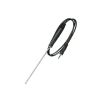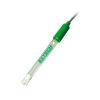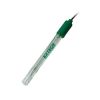Extech Oyster pH Meter
Features
- Memory function stores and recalls 25 labeled readings
- °C/°F switchable
- Audible beeper to alert user when function is completed
- Free ground shipping
- Expedited repair and warranty service
- Lifetime technical support
- More
Overview
The Extech Oyster Series pH/mV/Temperature Meter features a large LCD built into the adjustable flip-up cover that displays pH or mV and temperature simultaneously. The microprocessor-based meter has a splash-proof housing and front panel tactile touchpad to slope and calibrate.
Mechanics
The meter measures pH from 0 to 14pH, mV from -999mV to 999mV, and temperature from 32.0°F to 212.0°F (0.0°C to 100.0°C). The memory function stores and recalls up to 25 labeled readings. Self-diagnostics display codes help users troubleshoot electrodes, buffer, and temperature errors. The measurements are automatically or manually temperature compensated, and the meter is calibrated at a 5-point buffer recognition (1.68, 4.00, 7.00, 10.00, 12.45) with adjustable values. An audible beeper will sound when a function is completed.
- pH range: 0.00 to 14.00pH
- pH resolution: 0.01pH
- pH accuracy: 0.02pH
- mV range: 999mV to 999mV
- mV resolution: 1mV
- mV accuracy: 2mV
- Temperature range: 32.0°F to 212.0°F (0.0°C to 100.0°C)
- Temperature resolution: 0.1°
- Temperature accuracy: 0.8°F/0.5°C
- Dimensions: 3.7 x 4.2 x 2" (94 x 107 x 51mm)
- Weight: 12oz (340g)
- (1) Meter
- (1) Neckstrap
- (1) 9V battery
In The News
Ocean acidification: University of Washington's giant plastic bags help control research conditions
With oceans becoming more acidic worldwide, scientists are getting creative in designing experiments to study them. For example, one group at the University of Washington is using giant plastic bags to study ocean acidification. Each bag holds about 3,000 liters of seawater and sits in a cylinder-like cage for stability. The group at UW, made up of professors and students, is controlling carbon dioxide levels in the bags over a nearly three-week period, during which they are looking at the effects of increased acidity on organisms living near the San Juan Islands. “These mesocosms are a way to do a traditional experiment you might do in a lab or classroom,” said Jim Murray, professor of oceanography at the University of Washington.
Read MoreNOAA Alaska buoy network to monitor North Pacific ocean acidification
National Oceanic and Atmospheric Administration scientists detected signs of ocean acidification in the waters that hold the vulnerable and valuable fisheries of the North Pacific off the coast of Alaska, but they only had a snapshot of the action. “We know that in this place were important commercial and subsistence fisheries that could be at risk from ocean acidification,” said Jeremy Mathis, a NOAA Pacific Marine Environmental Laboratory researcher and professor at the University of Alaska Fairbanks. To understand how ocean acidification affects the North Pacific, NOAA scientists created a mooring network that collects constant in situ data on parameters contributing to acidification. They hope it will reveal seasonal trends and patterns left out by their snapshots.
Read MoreWildfire Prevention in the Sierra Nevada Region with the Yuba Watershed Institute
Though recent wildfires have sparked new conversations about wildfire management and response, groups like the Yuba Watershed Institute have been monitoring the forests and water resources of the Sierra Nevada region for decades, managing approximately 5,000 acres of land with the Bureau of Land Management (BLM) and about 7,000 acres in private land partnerships. The goal of the Institute is to work with local communities and land agencies to improve watershed and forestry management through informed practices and public outreach. The goals of the Yuba Watershed Institute are three-fold: Improve the ability of fire suppression agencies like the California Department of Forestry and Fire Protection ( CAL FIRE ) and the US Forest Service.
Read More















